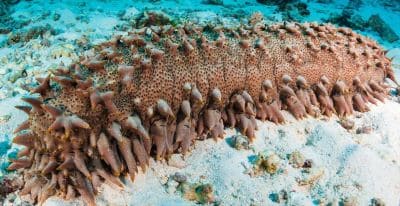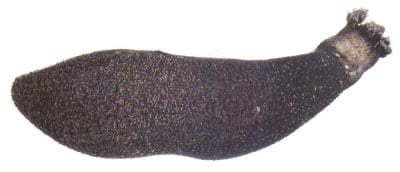Home › Ocean Life › Marine Animals › Invertebrates › Echinoderms › Sea Cucumber
Facts and Information about Sea Cucumbers
[Sea Cucumber Phylum: Echinodermata] [Subphylum: Echinozoa] [Class: Holothuroidea]
Scientists believe tropical sea cucumbers are helping with the global fight against harmful climate change and may reduce the damage that it causes to coral reefs.
This segment contains fun and interesting facts about the sea cucumber species, including where they thrive best, what they eat, and how these holothurian marine invertebrates reproduce.
Where Do Sea Cucumbers Live in the World
Holothuroidea is a classification within the phylum Echinodermata that contains around 1,200 different species of sea cucumbers.
So, where are sea cucumbers found in large numbers? They live in the benthic zones of most tropical and subtropical oceans, especially:
- Australia and New Zealand
- The Indian Ocean
- Western Pacific Ocean
Scuba divers and snorkelers often spot them embedded in the sand or on silty sediment on the seafloor, often crawling between coral reef gardens and other solid habitats, such as rock or boulder outcrops.
Sea Cucumber Characteristics
Unlike most marine creatures, sea cucumbers are sloth-like scavengers that slowly roam around searching for food scraps on the sea bed.
When they feed, they ingest small particles of sand to break down detritus and other organic matter and process it inside their gut.
They use bacteria to decompose their food. As a consequence of that, this digestion process creates sea cucumber poop (faeces) that help to increase the potential of hydrogen (pH levels) around the reef.
Here's the thing:
When different types of sea cucumbers defecate (expel their feces), there is a positive effect for the water because it can help coral reef polyps combat some negative effects of global climate change.
So, the soft-bodied sea cucumber scientific name Holothuroidea is most likely helping to reduce harmful high levels of acidity in the oceans.
The cylindrical body, often warty in appearance, can be as little as two centimetres long and less than a centimetre thick, or it can be up to two metres long (6 feet) and measure twenty centimetres round (8 inches).
How Do Sea Cucumbers Help the Ocean?
There is another benefit from the waste, calcium carbonate. Scientifically known as CaC03, calcium carbonate is an important component for the survival of the reef. This is because corals need to accumulate high levels of CaC03.
Sea cucumbers, along with other tropical "bioeroders" (e.g. sea urchins, marine worms, and chitons), are foremost contributors to the essential turnover of calcium carbonate.
When sea cucumbers digest the food, they also produce ammonia - which helps to fertilise the near vicinity. It also provides important nutrients which, in turn, encourage coral formation.
Benefits of Sea Cucumber Taxonomy
There are more than one thousand different species of sea cucumber that exist in the oceans, and they all have an important role to fulfil underwater.
 For example, the poop of the amber fish sea cucumber has benefits for aquatic ecosystems. It has a crown of tentacles that it uses to pick up sediment and stuff it into its mouth.
For example, the poop of the amber fish sea cucumber has benefits for aquatic ecosystems. It has a crown of tentacles that it uses to pick up sediment and stuff it into its mouth.
This sea cucumber phylum is renowned for digesting organic material and discarding everything else.
So, what comes out is actually cleaner than when it went in!
The "cleaner" sand helps to prevent algal blooms, which can cause fish to suffocate due to a lack of oxygen.
Furthermore, subtropical seagrass beds seem to grow healthier if sea cucumbers are living in the area. Therefore, coral reefs benefit from the alkalinity of the droppings from sea cucumbers by "buffering" them from the effects of ocean acidification.
Fun Fact: We were wondering what a group of sea cucumbers is called? To our surprise and amusement, one of the fun facts about sea cucumbers is that the collective noun is classified as a "prickle of sea cucumbers".
Types of Sea Cucumber Species
Amberfish Sea Cucumber (Thelenota anax)
Not only is Thelenota anax one of the most important marine invertebrates, it's also a fascinating species often encountered by recreational scuba divers.
Amberfish sea cucumbers have a number of funny scientific names for fish, including black teatfish, chief sea cucumber, curryfish, and the elephant trunk sea cucumber.
Distribution and Habitat
Their global range includes most of the tropical Indo-Pacific region, especially East Africa, the Red Sea, and large parts of the central Pacific (e.g., Australia, Fiji, and Micronesia).
Almost all of the sea cucumber varieties thrive best on sand or mud substrates found near coral reef slopes and lagoons, generally at depths ranging between ten (10) and forty (40) metres.
Description and Size
Most sea cucumber types have a soft, cylindrical body shape. The amber fish is a reddish-brown (somewhat orange) colour with some lighter blotches and knobby projections (called 'papillae') scattered around their body.
Amberfish sea cucumbers are one of the largest in the species, with fully grown adults reaching up to one (1) metre in overall body length and weighing more than six (6) kilograms.
Interesting Fact: It's quite common to see ectocommensal species, especially scale worms (Polynoidae), living on the thick leathery skin of these soft-bodied marine animals. In addition, the slender pearlfish (of the family Carapidae) is known to enter the anus of a sea cucumber to secure a predator-free habitat.
Apostichopus Japonicus
Black Teatfish (Holothuria nobilis)
Blackspotted Sea Cucumber (Pearsonothuria graeffei)
Blue Sea Cucumber (Actinopyga caerulea)
Bohadschia Cousteaui
Deep Water Redfish (Actinopyga echinites)
Florida Sea Cucumber (Holothuria floridana)
Giant Red Sea Cucumber (Apostichopus californicus)
The giant red sea cucumber is one of the heaviest of the species, with some specimens weighing up to one (1) kilogram (2.2 pounds).
Gummy Squirrel (Psychropotes longicauda)
One of the most unusual of all sea cucumbers is commonly known as the 'gummy squirrel', a rare species of deep-sea holothurian within the family Psychropotidae.
Another page contains some little-known information about Psychropotes longicauda, a sea cucumber that looks like a gummy bear with an upright bright yellow squirrel-like tail.
Hairy Blackfish (Actinopyga miliaris)
Its common name is the hairy blackfish. But, these sea cucumbers belong with the family Holothuriidae, of the Phylum Echinodermata (meaning spiny skin).
Geographical Distribution
For the most part, Actinopyga miliaris is superabundant in the tropical West Indo-Pacific region, where it is often collected and harvested commercially for food.
 Nonetheless, the species also thrives around shallow coastlines and coral reef ecosystems in:
Nonetheless, the species also thrives around shallow coastlines and coral reef ecosystems in:
- Africa (including the Red Sea)
- French Polynesia
- Northern Australia
- South East Asia (SEA)
- Western Pacific Ocean
The hairy blackfish prefers to live around shallow rubble deposits and fringing reefs. Thus, it would be rare to see it deeper than twenty (20) metres (70 feet).
Size and Characteristics
Actinopyga miliaris is one of the biggest species of sea cucumber. The hairy blackfish can grow up to thirty (30) centimetres long (14 inches) with a sausage-shaped body measuring around ten (10) centimetres in diameter (4 inches), and a rough, almost leathery, body wall that can be nine (9) millimetres wide.
It's common to see mucus and fine sediment covering the black bivium (face dorsal) and the conical fleshy projections (papillae) running along its elongated, cylindrical body. It also has five strong, triangular shaped anal teeth surrounding its anus.
Conservation Status
Unlike some of the smallest sea cucumbers still in existence, such as Psammothuria ganapati that grows no more than four millimetres long, hairy blackfish are easy to collect by hand and often exploited for commercial use.
Pro Tip: The IUCN Red List of Threatened Species last assessed Actinopyga miliaris in 2010 and cited it as being "Vulnerable" (VU) with the population trend "decreasing".
Holothuria Scabra
Labidodemas Quadripartitum
Labidodemas Spineum
Leopard Sea Cucumber (Bohadschia argus)
Orange-Footed Sea Cucumber
Pacific White-spotted Sea Cucumber (Actinopyga varians)
Pineapple Sea Cucumber (Thelenota ananas)
Purple Sea Cucumber
Pictures of a purple elasipodida (class holothurian) show the animal using numerous appendages to crawl on the silty seafloor around 900 metres below the surface (3,000 feet).
The international research team filmed it around the base of some undersea mountains (seamounts) near the Galápagos Islands, a famous archipelago in Ecuador.
Using high-resolution sonar imaging, they captured important information about the "Galápagos Platform" and diverse communities of fish, sea sponges, and deep coral structures in this part of the Eastern Pacific Ocean.
Robust Sea Cucumber (Colochirus robustus)
Rough Sea Cucumber (Actinopyga crassa)
Sea Pigs (Scotoplanes)
Snake Sea Cucumber (Synapta maculata)
The snake sea cucumber is the largest in all the sea cucumber classification with some examples growing to three (3) metres in length (10 feet).
Snot Sea Cucumber
Spotted Sea Cucumber (Bohadschia maculisparsa)
Strawberry Sea Cucumber
White Teatfish (Holothuria fuscogilva)
How Do Sea Cucumbers Reproduce?
Most species of sea cucumber reproduce by releasing eggs and sperm into the water. Hence, fertilisation happens externally.
Instead of direct mating, they spawn by broadcasting their gametes into the ocean. During the spawning season, sea cucumbers release their eggs and sperm into the water column 'simultaneously' to increase the chances of a successful outcome.
Sea Cucumber Predators and Threats
Natural predators of sea cucumbers include pufferfish, parrotfish, and triggerfish, as well as crabs, sea stars, and some types of sea turtles.
Some predators attack by biting off the soft part or ingesting the entire animal, though the sea cucumber's tough skin - and their unusual ability to expel sticky internal organs - sometimes deters them.
However...
The greatest modern threat to sea cucumbers is overharvesting, mainly for seafood and traditional medicine trades (especially for dried bêche-de-mer).
Loss of habitats, pollution in the ocean, and climate change also pose significant dangers. Not only do they reduce populations, but they also damage the reefs and seabeds that they depend on.
Pro Tip: A 2010 assessment issued by the IUCN Red List of Threatened Species, shows the conservation status of most sea cucumber species is "Least Concern" (LC). Nonetheless, they list the spotted sea cucumber (Bohadschia maculisparsa) and Holothuria arenacava as "Vulnerable" (VU).
Related Information and Help Guides
- Echinoderm Facts and Examples with Species Information
- Sand Dollar Facts about Anatomy and Reproduction
- Sea Urchin Phylum and Treatment for Puncture Wounds
- Starfish Species Facts and Information with Pictures
Note: The short video [4:37 minutes] presented by "Deep Marine Scenes" contains more sea cucumber facts with some incredible footage of the soft-bodied marine animals known as the vacuum cleaners of the reefs.